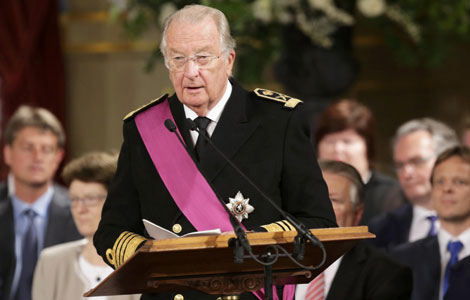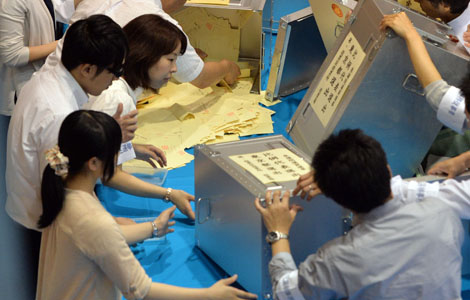Carbon trading gains momentum in China
Updated: 2013-07-22 10:45
(Xinhua)
|
||||||||
GUIYANG - Chinese government officials, environment and energy experts, and entrepreneurs have vowed to join hands in accelerating the process of building a nationwide carbon emissions trading market.
"The country will soon carry out scientific methods to record enterprises' carbon emissions in major industries and find ways to allocate emissions quota appropriately, as preparations for a nationwide carbon emissions trading market," said Su Wei, director of the climate change department of the National Development and Reform Commission.
Su said at an ongoing international environmental protection forum held in Guiyang, capital of Southwest China's Guizhou province, that as pilot carbon emissions trading schemes will be launched successively in seven provinces and cities in 2013 and 2014, the country is gaining momentum in curbing greenhouse gas emissions with a market mechanism.
Experts and industry leaders, on the other hand, have warned of potential difficulties in terms of the legislature, carbon financing, statistics gathering and quota allocation, monitoring and assessment systems -- all of which are key to building a mature market.
"Carbon emissions trading will remain a fake market until these problems are solved," said Xiong Yan, head of the Chinese State-owned Property Exchanges Association.
Pilot Scheme progress
One month prior to the forum, China launched its first regional market for compulsory carbon trading in the southern city of Shenzhen after more than two years of preparations.
The scheme covers 635 industrial companies and some public buildings that account for about 40 percent of the city's carbon emissions. The carbon intensity, or the amount of carbon produced per unit of gross domestic product, of the 635 industrial companies in 2015 will drop 32 percent from the levels in 2010.
Under the trading program, those that emit below their quotas could sell their excess limits to other emitters and even investors for profit.
Eight deals, or 21,112-ton carbon quotas, were traded on the first day at prices ranging from 28 to 32 yuan ($4.6 to $5.2) per ton.
- China starts carbon trading in Shenzhen
- Less carbon, less pollution
- Future points to carbon trading
- China takes center stage in preparedness for low-carbon economy
- China to build unified low-carbon certification system
- China to introduce carbon tax: official
- China makes headway in lowering carbon intensity in 2012
Most Viewed
Editor's Picks

|

|

|

|

|

|
Today's Top News
Woman jailed in Dubai after reporting rape
Guangdong to probe airport bomber's allegations
Police meets GSK representative after scandal
US protests demand 'justice for Trayvon'
6.6-magnitude quake hits NW China
Minister rules out stimulus package
Top Chinese admiral to visit US this year
Victory improves Abe's hand
US Weekly

|

|














